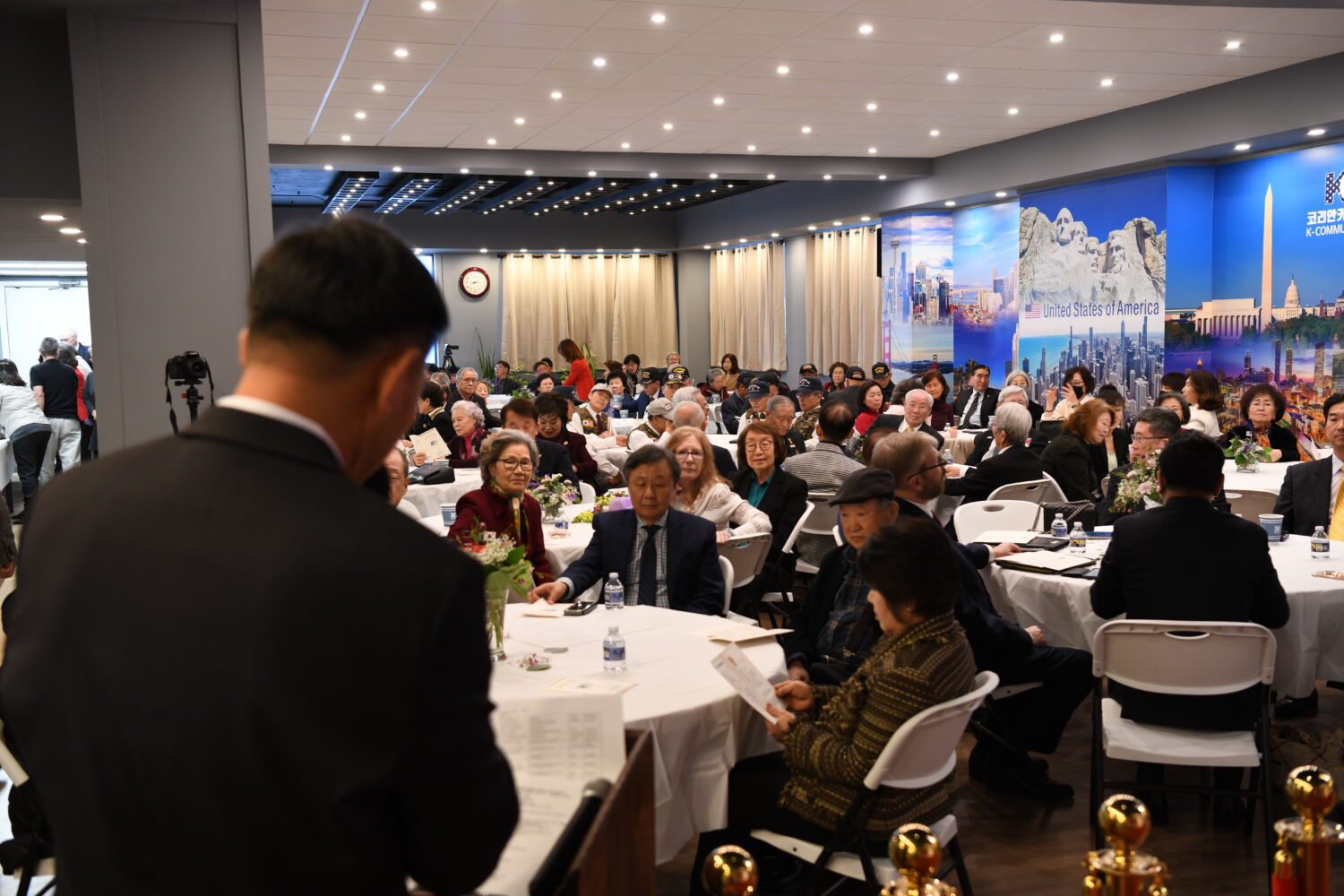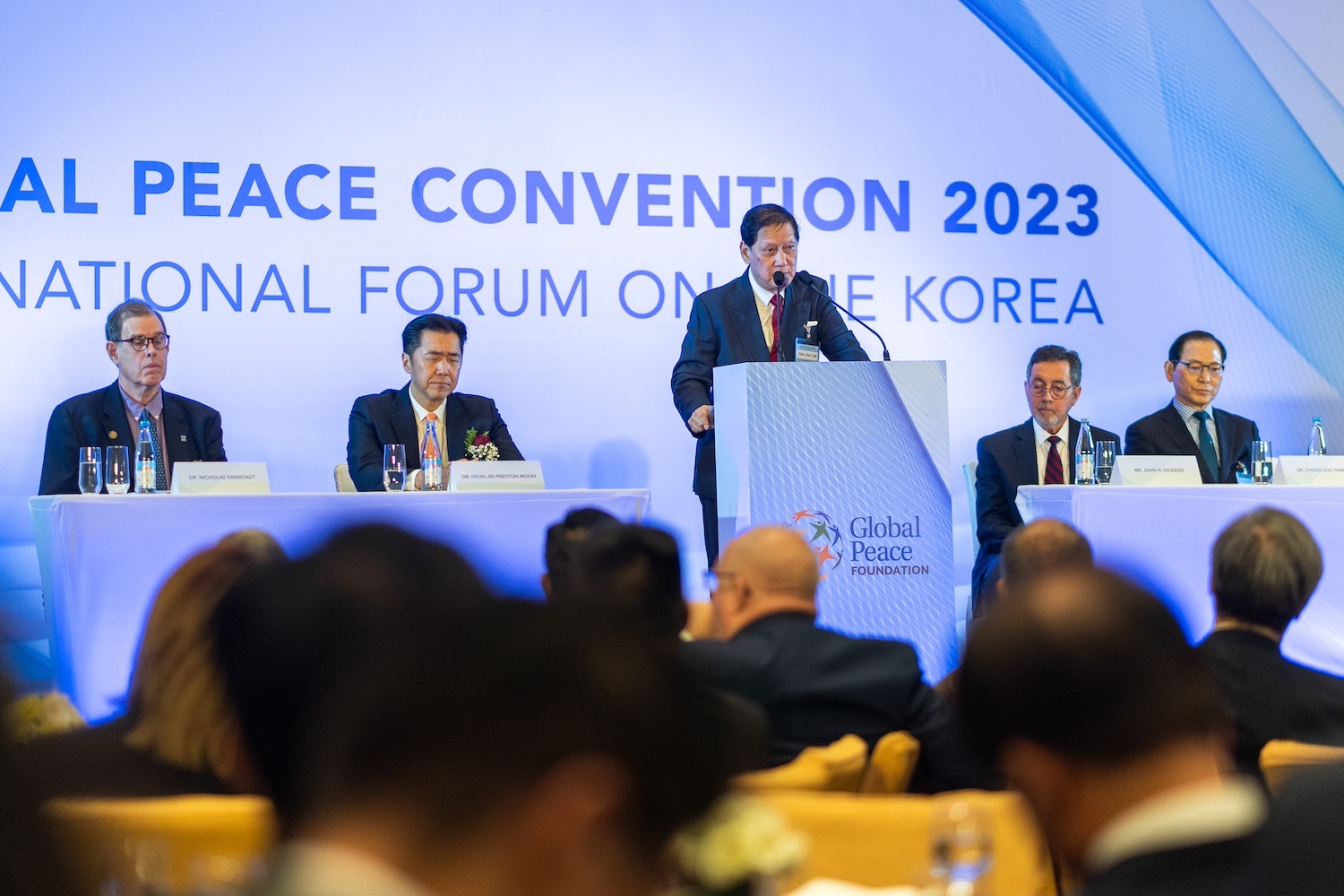Chairman of Global Peace Foundation Dr. Hyun Jin P. Moon described the powerful impact civic society can have in reunification efforts on the Korean peninsula in an interview with Chang-in Jang, CEO of JSI Partners, for Pub Chosun. Pointing to his book Korean Dream: A Vision for a Unified Korea, Dr. Moon outlined a vision for reunification based on the power of the Korean people. “In the past, the issue of unification focused on the ‘process.’ However, the Korean Dream book focuses on the ‘results’ of unification as it deals with Korean history.”
The full interview in Korean can be found on Pub.Chosun.
The following is an unofficial translation of an interview that Dr. Moon gave with Chosun Newswire.
‘Unification should be driven by the people, not the government.’
Original Korean article by Jang Sangin
Dr. Moon, Chairman of the Global Peace Foundation delivered the keynote addresses at the International Forum on One Korea and the Action for Korea Festival, held in commemoration of the 100th anniversary of the March 1st Movement and the 74th anniversary of the Korean Independence Day in Seoul. The events were attended by national and international leaders.
GPF, an international nonprofit organization headquartered in Washington DC, was established in 2009. GPF is active in 23 countries around the world and has special consultative status with the Economic and Social Council of the United Nations (ECOSOC) and is a partner of the United Nations Department of Public Information (DPI). I recently interviewed Moon Hyun-jin at The Plaza Hotel in front of City Hall. This is a question and answers session with Dr. Moon.
▼Can you explain the type of organization Action for Korea United is?
“AKU (Action for Korea United)” is a global alliance of people and organizations around the world who are working for the vision of unification. AKU is not only the largest civic organization in Korea, it is also engaging Koreans in the diaspora. “
▼ Can you explain in more detail the approach and activities of Action for Korea United.
“Our approach is not one-dimensional. Let me explain more about AKU. This is a civic movement. In other words, it is a collective effort of different religious groups, NGOs, charities, civil society, etc. working together. It also serves as a think tank for government and policymakers. ”
▼ What is the most important point in the “Korean Dream” that you continue to emphasize?
“The most important point that I talk about in my book ”Korean Dream” is that the people should recognize that they can do something for unification, and they should strengthen their efforts to support unification. This book presents a vision for unification. The vision presented in the book has changed the paradigm of how to view unification. Until now discussion on unification has been focused on the process. However, my book, “Korean Dream” focuses on the ‘end goal’ of unification as it connects with Korean history. If we want unification, we have to know “What kind of country do we envision?” I wrote “Korean Dream” to articulate our Korean aspiration, our common hopes that are connected to our historic roots.”
▼ What kind of unification to you envision?
“One of the things that have shocked me was the lack of understanding of Korean history. Particularly, there has been a lot of debate about the cost of unification. Many Korean scholars have written papers based on CIA research. However, there is a complete misunderstanding of these CIA studies. The studies use the German model of unification. However, Germany and Korea are two completely different countries. The nature of these nations is very different. The specifics of how unification will play out will be very uniquely different. We need to view unification in a way that is consistent with Korea’s unique situation. As I mentioned in the keynote speech of the 2019 One Korea International Forum, North Korea has all the necessary resources to achieve the level of growth that South Korea has enjoyed over the last few decades.”
▼ How then should we be pursuing unification?
“The problem is that the current South Korean economic policy is not ready for unification. There are several issues, but one is aging population. In the current situation, the South Korean economy cannot continue to grow. The only way to correct these issues is to reform the Korean economy. I am looking at the opportunity presented by unification, much like a merger, not the cost. Unification will eventually create incredible economic synergy.
Furthermore, unification should not be led by the government, but through the participation of all Koreans. The people should debate and come to a consensus on the kind of country they want to build.
▼ What do you mean when you say that unification should be led by the people?
“We should not be thinking, “Unification is the responsibility of the government. What can we actually do?” Think about it. In Korean history, the government did not bring about major milestones. The people did. Major historical changes in Korean history came to pass because of the people, not the government. A prime example is democratization. The democratization of Korea succeeded when the people stood up. The people rose up and overthrew the military dictatorship to build a democracy. But, most Koreans haven’t yet realized that every individual can contribute to unification.”
▼ I heard the speech you delivered Paraguay, South America, in 2013. What did you do in Paraguay?
“When I first went to Paraguay in 2008, U.S. citizens were advised not to visit. We basically transformed the country. It moved from one of the most economically underdeveloped countries to a nation that the U.S. has marked as a nation with one of the highest economic potentials. This doesn’t happen often. But Paraguay could accomplish this because our work began with the long-term goals of democratization and economic development in mind. Our work was driven by such a purpose… Eight years of our work, and we are here today. The United States now wants to maintain a strong and bilateral economic relationship with Paraguay.”
▼ Please tell us again about the democratization of Paraguay.
“When I first went to Paraguay, the president wanted to remain president. It was like he wanted to be a dictator. I have stopped him. We should remember that most dictators have gained power through a democratic process. Hitler gained power through democratic processes. Dictators are those who abuse their power by using the government as a tool to attack their political opponents. GPF’s framework comes from the point of view of national transformation.
▼ What do you think is true democracy?
“I grew up in the United States. I think democracy has lasted as long as it has in the United States because of an informed and engaged citizenry. That is what is needed for a healthy democracy, not just one political party in power. Why? Because it’s an honest process. If a political party uses power to attack its opponent, it will not have a healthy opposition. Without a healthy opposition, no one can control the dictator. So when in any country when power begins to be abused, the people should be worried.”
Chairman Moon Hyun-jin emphasized that ‘the people’s participation is critical for unification, it should not be government-led.’
“The will of the people is most important for Unification. If people have ownership of a vision, the government will understand what kind of country they should pursue.”
Dr. Moon expressed his determination to carry on the work his father, Sun-Myung Moon (1920-2012), began.
“My father opened North Korea in 1991. At that time, North Korea was an even more closed society. I am also trying to walk the path that will open the doors to North Korea.”



